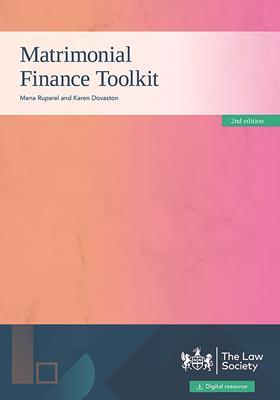Matrimonial Finance Toolkit (2nd edition)
Mena Ruparel and Karen Dovaston
£85, the Law Society
★★★★★
I reviewed the first edition of this book in the Gazette seven years ago. It was an excellent publication then and, now in its second iteration, has definitely maintained its quality. After all, it was a book that was difficult to improve on.
There have been many changes in family law in the last seven years. These include ‘no-fault’ divorce, the introduction of MyHMCTS, the digital portal for divorce, and what are now known as ‘financial remedy’ orders rather than ancillary relief. Moreover, a standard suite of financial orders has been introduced which we, as family lawyers, are strongly encouraged to use. Further, non-court dispute resolution has been extended and failure to engage with the process without good reason will result in likely costs sanctions. I could go on.
Deceptively slim and compact, this book takes these changes into account. It leads the reader logically through the process of divorce before moving on to explain the different processes that can be used to resolve a financial matter. These include arbitration, collaborative law, early neutral evaluation and private financial dispute resolution (FDR) hearings, as well as mediation.

Should it be necessary to make a financial remedy application, the book guides the reader through the steps from the very outset, both in relation to contested proceedings and, more commonly, where agreements result in draft consent order applications. It covers voluntary as well as court-based disclosure via the Form E financial statement.
In turn, the three types of hearing are explored: the first directions appointment, the FDR and the final hearing, should the latter be necessary. There is a sample questionnaire and request for documents, along with useful letters to experts such as property valuers and forensic accountants. In addition, throughout, there are plain-English letters to clients. These explain the process as it moves on and describe the format of the various hearings.
The book does not stop at financial remedy matters, as it also covers Schedule 1 Children Act proceedings.
While the original work had a CD-ROM, this toolkit comes with over 30 downloadable template documents with guidance on how to tailor each one to particular cases. These range from, for example, a pro forma note of an initial advice session form to a letter to the client explaining pension options, and a note with guidance as to helping oneself to the other party’s financial documentation in the light of Imerman.
This book remains a very worthy addition to the family law library.
Tony Roe is a family law partner, arbitrator, collaborative lawyer and mediator, working towards accreditation, at Dexter Montague LLP, Reading































No comments yet